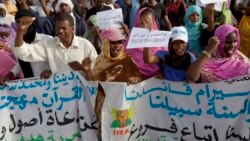Tensions are running high in the Northwest African nation of Mauritania following the conviction of three anti-slavery activists arrested and charged with leading an unregistered organization, organizing an unauthorized rally, and resisting arrest. Demonstrators protesting the sentencing of Biram Ould Abeid, Brahim Bilal and Djiby Sow were dispersed by police using tear gas January 15 in the southern city of Rosso. Hundreds had surrounded the courthouse where the three men were tried and given two-year prison terms, even after seven others arrested with them were released.
Ould Abeid, who came in a distant second in last year’s presidential election there, had met his supporters in Rosso, while they were criss-crossing the country to raise awareness of land rights of Mauritania’s historically enslaved Haratine community when he was arrested.
He and other members of the Initiative for the Resurgence of the Abolitionist Movement were accused by authorities of spreading racist propaganda and belonging to an “unrecognized organization.” Leaders of human rights groups in Mauritania are urging more protests against the jailing of the three activists, calling it unjustified and politically inspired.
The United States is closely following the legal proceedings against Ould Abeid, Brahim Bilal and Djiby Sow. We are deeply concerned by the January 15 court decision and the impact this ruling will have on freedom of association and assembly in Mauritania.
We urge the appellate court to review both the convictions and the sentencing without delay, and to handle these important cases in a fair, impartial and transparent manner. We are committed to continuing our support of efforts by the Mauritanian government and civil society to eliminate slavery in that country, which must be a sustained and collective effort by government, religious, law enforcement, judicial, tribal and civil society leaders together with all of the nation’s citizens.
















